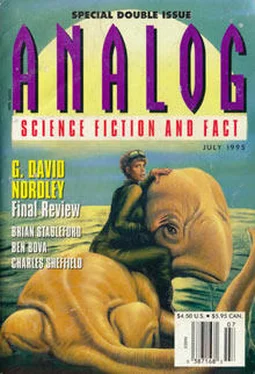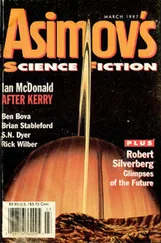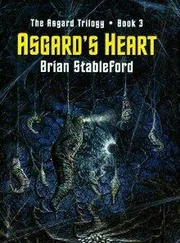Brian Stableford - Inherit the Earth
Здесь есть возможность читать онлайн «Brian Stableford - Inherit the Earth» весь текст электронной книги совершенно бесплатно (целиком полную версию без сокращений). В некоторых случаях можно слушать аудио, скачать через торрент в формате fb2 и присутствует краткое содержание. Год выпуска: 1995, Издательство: Dell Magazines, Жанр: Фантастика и фэнтези, на английском языке. Описание произведения, (предисловие) а так же отзывы посетителей доступны на портале библиотеки ЛибКат.
- Название:Inherit the Earth
- Автор:
- Издательство:Dell Magazines
- Жанр:
- Год:1995
- ISBN:нет данных
- Рейтинг книги:5 / 5. Голосов: 1
-
Избранное:Добавить в избранное
- Отзывы:
-
Ваша оценка:
- 100
- 1
- 2
- 3
- 4
- 5
Inherit the Earth: краткое содержание, описание и аннотация
Предлагаем к чтению аннотацию, описание, краткое содержание или предисловие (зависит от того, что написал сам автор книги «Inherit the Earth»). Если вы не нашли необходимую информацию о книге — напишите в комментариях, мы постараемся отыскать её.
Inherit the Earth — читать онлайн бесплатно полную книгу (весь текст) целиком
Ниже представлен текст книги, разбитый по страницам. Система сохранения места последней прочитанной страницы, позволяет с удобством читать онлайн бесплатно книгу «Inherit the Earth», без необходимости каждый раз заново искать на чём Вы остановились. Поставьте закладку, и сможете в любой момент перейти на страницу, на которой закончили чтение.
Интервал:
Закладка:
“I don’t know,” Kachellek said, emphatically and defensively. “I don’t understand what’s happening.”
“Tell me about Surinder Nahal,” Damon said, abruptly.
Kachellek still hadn’t recovered his usual icy calm. “What about him?” he asked, unhelpfully.
“Come on, Karol, think. Silas isn’t the only one who’s gone missing. Could whoever made that tape be deliberately pointing the linger of suspicion at Nahal?”
“Nahal was a bioengineer back in the old days,” Kachellek said. “His field of endeavour overlapped ours to some extent. There was a little bad feeling because he thought he hadn’t been given his fair share of credit for establishing the New Reproductive System, but nothing serious. I haven’t heard of him in fifty years; I presume that he retired, like Silas. I can’t believe that he’s responsible for all this. It makes no sense. It must be someone from...”
“Someone from what?” Damon asked, sharply, when Kachellek stopped in mid-sentence again. Kachellek had no intention of finishing, though; he deliberately turned away. Whatever he knew, he wasn’t going to state it aloud. Perhaps that was because he was in a room whose walls might easily be host to a dozen eyes and ears, but Damon felt that it was a personal slight aimed at him, a deliberate exclusion.
“Is there any possibility,” Damon said, with careful hostility, “that the viruses which caused the plague of sterility really were manufactured, by someone? Could the Crash have been deliberately caused?”
Kachellek immediately met his eye again, pugnaciously. “Of course it could, he snapped, as though it ought to have been perfectly obvious. “People don’t talk about it nowadays, of course, because it’s not considered a fit topic for polite conversation, but the world before the Crash was very different from the one in which you grew up. There were a lot of people prepared to say that the population explosion had to be damped down one way or another—if not by voluntary restraint then by war, famine or plague. Primitive anti-aging technologies had already become available, and it was easy enough to see that things could get very fraught indeed when they became cheaper and more efficient. A lot of mutant viruses were arising naturally—ten billion people crammed into polluted supercities constitute a wonderland of opportunity for virus evolution—and a lot more were being tailored in labs for use as transgenic vectors, pest controllers, so-called beneficial fevers and so on. All kinds of things came out of that cauldron, as many by accident as by design. When the Crash began, speculation that it had been deliberately caused was rife; it wasn’t until the Crash had almost run its course that people put that kind of talk aside to concentrate all their attention and energies on the problem of what to do about it. This is just a resurrection of ancient and tired rumours, Damon. I don’t know whether to be glad or alarmed that there are so few people around who remember the last time they did the rounds. The fact remains that we didn’t do it. We’re not guilty of any wrongdoing.”
Damon knew that Karol Kachellek had been bom in 2046; he had been fifteen years younger than Conrad Helier and seven years younger than Silas Arnett. Surinder Nahal must have been much the same age—about thirty years off the current world record for longevity—but the fact that the slanders were old didn’t mean that the slanderer had to be equally old. The history of the twenty-first century was all on the Web, easily accessible to anyone who cared to dig.
“Were you actually present when my father died, Karol?” Damon asked, quietly.
“Yes I was. I was by the side of his hospital bed, watching the monitors. His nanomachines were at full stretch, trying to repair the internal damage, but they just weren’t up to it. He’d suffered a massive cerebral hemorrhage and there were more complications than I can count. We call ourselves emortals, but we’re not really immune to disease and injury, even if we exclude the effects of extreme violence. There are dozens of potential physiological accidents with which the very best internal technology is impotent to deal even today. Kids of your generation, who feel free to take delight in savage violence because its effects are mostly reparable, are stupidly playing with fire. In essence, your father died of a massive stroke—but if the lunatic who made that tape intends to build a case on the seeming implausibility of that cause of death he’s barking up the wrong tree. If Conrad had wanted to fake his death, he’d have chosen something far more spectacular.”
“How did you know he was dead?” Damon asked.
“I told you,” Kachellek replied, with ostentatious patience. “I was watching the monitors. I also watched the doctors trying to resuscitate him. I wasn’t actually present at the post mortem , but I can assure you that there was no mistake.”
Damon didn’t press the point. If Conrad Helier had faked his death, Karol Kachellek would surely have been in on the conspiracy, and he was hardly likely to back down now. “I’m going back to L.A. as soon as I can,” he said. “Maybe you ought to come with me. The people who took Silas might have designs on you too. The police can offer you far better protection in L.A. than they can in a desolate spot like this.”
“I can’t go anywhere,” Kachellek said, stubbornly. “I’ve got work to do— here. ”
I have work to do too, Damon thought. I know what skills it took to put that tape together, technically and in terms of its narrative implications and through Madoc I have access to some first-rate outlaw Webwalkers. I can get to the bottom of this, if I try hard enough, no matter how insistent you are on keeping me out of it.
The last scheduled flight from Honolulu was due out at nine. Karol Kachellek—who was an important man on Molokai—had no difficulty at all in requisitioning a light aircraft and a pilot to fly it out of Kaunakakai. Damon wasn’t in the least flattered that his foster-father took the trouble; he could see how keen Kachellek was to see the back of him.
Damon would rather have sat up front in the cockpit of the plane but he wasn’t given the choice. He was ushered into one of the four passenger seats by the pilot, who was a stocky man with greying temples and an Australian accent. Presumably he thought the grey made him look more dignified; he looked to have money enough to have corrected it if he’d wanted to.
“We’ll be up and down in no time at all,” the pilot told him, before taking his own seat. “Might be a little rough in the wind, though—better keep your belt on.”
Damon thought nothing of this instruction to begin with, and he was so deep in thought that ten or twelve minutes had elapsed before he finally took note of the fact that the Sun—which should have been dead ahead of the plane’s course—was way over to starboard.
“Hey!” he called to the pilot. “What’s our course?”
The pilot made no reply. That was when Damon tested his safety-harness and found that it was locked tight. He called out again, demanding to know what was going on, but the pilot wouldn’t even turn around to look at him. He realised, cursing himself for not having done so before, that he was being kidnapped.
Damon’s knowledge of the local geography was vague, but he figured that if they were heading south they’d be over Lanai at much the same time that they ought to have been coming down at Honolulu. How many other islands there might be to which they might be headed he had no idea, but there were probably several, and the plane was small enough to land on any kind of strip.
“Was this Karol’s idea?” he shouted to the pilot? “Or are you working for someone else entirely?”
Читать дальшеИнтервал:
Закладка:
Похожие книги на «Inherit the Earth»
Представляем Вашему вниманию похожие книги на «Inherit the Earth» списком для выбора. Мы отобрали схожую по названию и смыслу литературу в надежде предоставить читателям больше вариантов отыскать новые, интересные, ещё непрочитанные произведения.
Обсуждение, отзывы о книге «Inherit the Earth» и просто собственные мнения читателей. Оставьте ваши комментарии, напишите, что Вы думаете о произведении, его смысле или главных героях. Укажите что конкретно понравилось, а что нет, и почему Вы так считаете.


![Лаура Бренз - Потомственная ведьма[Inherit the Witch]](/books/79609/laura-brenz-potomstvennaya-vedma-inherit-the-witch-thumb.webp)









